SUGAR-THE SWEET KILLER. ITS SOURCES, TYPES, WHAT THE PROBLEM IS, INCLUDING DANGERS OF EXCESSIVE INTAKE AND HOW WE CAN REGULATE IT.
One thing we need to keep track on is our Sugar intake. Really! Whether white sugar, brown r red, refined, granulated or natural sugar, you need to know how and when to take them more.
Sugar is everywhere. In addition to naturally occurring in your favorite fruits and vegetables, sugar is also added to most commercially prepared and prepacked foods. Sugar's increasing prevalence in our world may be making our food sweeter, but it is also having a hugely negative impact on the health of people around the world.
Sugars are carbohydrates, whose metabolism in our cells give ENERGY.
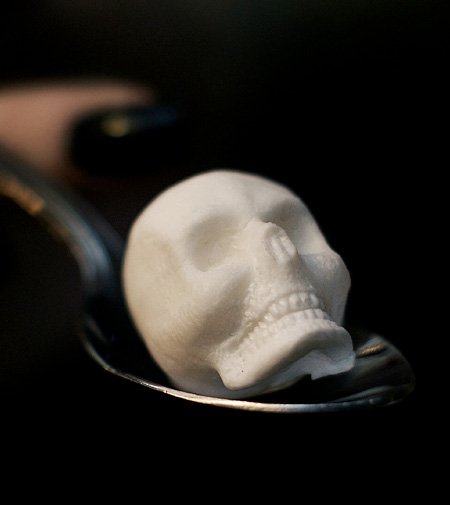)
CARBOHYDRATES are chemical compounds of carbon, oxygen and hydrogen (in various combinations). We can divide them into two large groups - digestible and non-digestibles.
Sugars are digestible. They are fibers foods.
Here, we would be looking at types of sugar, their sources, and the amount of sugar they have.
There are two types of known sugar namely :
- Monosaccharides
- Disaccharides
- Monosaccharides
Fructose, galactose, and glucose are all simple sugars, monosaccharides, with the general formula C6H12O6. They have five hydroxyl groups (−OH) and a carbonyl group (C=O) and are cyclic when dissolved in water.
)
Fructose, or fruit sugar, is the sweetest of all the sugars. It occurs naturally in fruits, some root vegetables, sugar cane and honey. It is one of the components of sucrose(table sugar).
Galactose does not occur in the free state but is a constituent with glucose of the disaccharide lactose or milk sugar. It is less sweet than glucose. It is a component of the antigens found on the surface of red blood cells that determine blood groups.
Glucose, dextrose or grape sugar, occurs naturally in fruits and plant juices and is the primary product of photosynthesis. Glucose syrup is a liquid form of glucose that is widely used in the manufacture of foodstuffs. Most ingested carbohydrates are converted into glucose during digestion and it is the form of sugar that is transported around the bodies of animals in the bloodstream. It can be manufactured from starch by the addition of enzymes or in the presence of acids.
- Disaccharides
Lactose, maltose, and sucrose are all compound sugars, disaccharides, with the general formula C12H22O11. They are formed by the combination of two monosaccharide molecules.
Lactose is the naturally occurring sugar found in milk. A molecule of lactose is formed by the combination of a molecule of galactose with a molecule of glucose.
Maltose is formed during the germination of certain grains especially barley, which is converted into malt - the source of the sugar's name. A molecule of maltose is formed by the combination of two molecules of glucose. It is less sweet than glucose, fructose or sucrose.
Sucrose is found in the stems of sugarcane and roots of sugar beet. It also occurs naturally alongside fructose and glucose in other plants, in particular fruits and some roots such as carrots. The different proportions of sugars found in these foods determines the range of sweetness experienced when eating them.
Sugars are found in the tissues of most plants and are present in sugarcane and sugar beet in sufficient concentrations for efficient commercial extraction.
Natural sugar isn't really the problem..
Natural sugar is naturally occurring, which makes them healthy.
Added sugars, however, are processed and can lead to weight gain.
There are two different kinds of natural sugars: fructose, which is found in fruit, and lactose, which is found in dairy.
The sugar you find in a candy bar is very different from the sugar you find in a strawberry or mango fruit. Theses are naturally occurring and poses zero health risks. Here's why.
Natural sugar comes with fiber or protein.
There are two types of natural sugar..
- fructose and
- lactose.
Fructose is the kind of sugar you find in fruit, while lactose is the kind you find in dairy products. But both are naturally occurring.
The healthy thing about both fructose and lactose is that when you consume them, you consume them with other important nutrients like fiber in the case of fructose, or protein in the case of lactose.
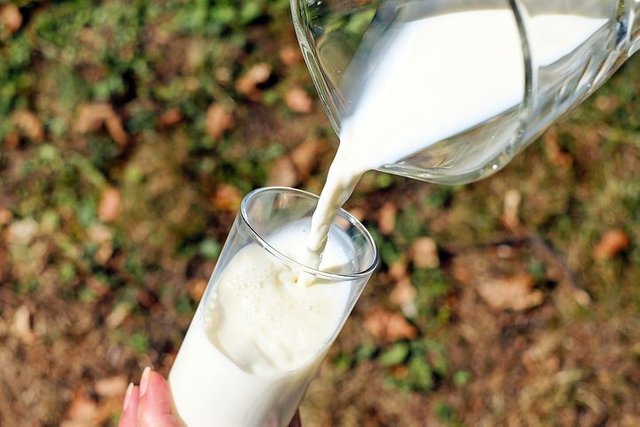)
Added sugar has no benefit for your body.
As the name implies, added sugars are processed forms of sugar, like syrups, flavors made of organic chemicals, that are added to certain foods when they're being made. Because these sugars are processed and not natural, they're not as good for your body.
This is why any nutritionist will tell you that it's much healthier to eat an orange versus drink a glass of orange juice. The juice contains added sugars, the orange does not. Consumption of too much added sugar likely ends up with excess weight gain.
EXCESS OF IT MAY LEAD TO
Thickness/Fat
Sugar is stored in the form of glycogen in the liver and muscles. When all supplies are filled, then it turns into fatty tissue.Sugar is,and in fact, responsible for a modern epidemic of obesity.
Addiction
More and more studies have shown that sugar and sweet foods can stimulate the behavior of addiction in humans. Children get addicted to eating candy and sweet food. This has become a big problem because interests are as always in question. Is the food industry loses its ground under its feet?
Where are the researches on the danger of sugar? Is Somebody pushing them under the carpet?
Immune system disorder
Studies have shown that the activity of phagocytes (cells that destroy harmful substances), deteriorated at least five hours after excessive intake of simple sugars. Also,
calories that do not burn in the body, are stored in the liver in the form of fat, and the consequence may be a condition called fat liver.
Cavity
The appearance of cavity is conditioned by sweet and sticky foods in contact with the bacteria in the mouth. Bacteria produce acid that cracks the tooth enamel. This then increases if proper care or cleaning of the mouth is not done.More sugar, more acids!!
Early face disorder
Sugar also causes changes on the face - the symptoms of sugar face, are acne and pale skin. Sugar also slows the synthesis of collagen and elastin, so your skin will lose its healthy and fresh appearance.It is clear that we have to do something with sugar.
Use these simple tips to reduce sugar in your diet:
- Remove sugar (white and brown), syrup, and molasses from the table —Because out of sight, out of mind!
- Cut back on the amount of sugar added to your coffee, tea and other drink. Take more of less sweetened milk.
- Buy sugar-free or low-calorie beverages.
- Instead of adding sugar to cereal or oatmeal, add fresh fruit (try bananas, cherries or strawberries) or dried fruit (raisins, cranberries or apricots).
- Instead of adding sugar in recipes, use extracts such as almond, vanilla, orange or lemon.
- Enhance foods with spices instead of sugar; try ginger, allspice, cinnamon or nutmeg.
Substitute unsweetened applesauce for sugar in recipes (use equal amounts).
I CONCLUDE BY SAYING THIS
Our body may not really tell the difference between processed and natural sugar. Fruits still have a lot of sugar, but that is offset because there are so many other things like fiber and nutrients. That's why it is almost always recommended to eat fruit instead of drinking fruits. Try drinking a glass of orange juice vs eating the 4 oranges that it would take to make that glass. Try almonds, date fruits, and other natural fruits for sugar sources.

REFERENCES
1. What is sugar
2. How to reduce added sugar
3. Bad sides of sugar intake
IMAGE SOURCES
image 1-Toxels.com
Image 3-pixabay.com
Image 4
Image 5
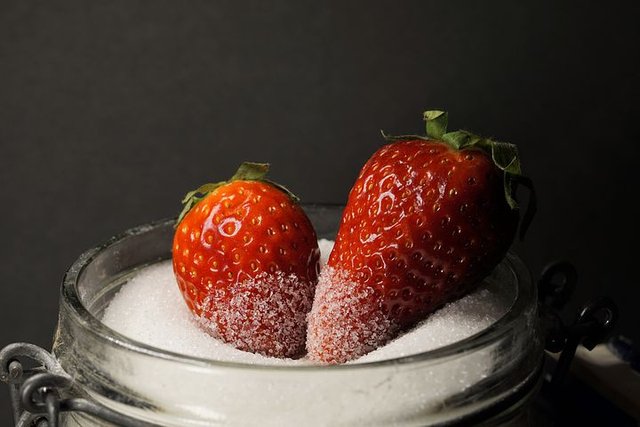)
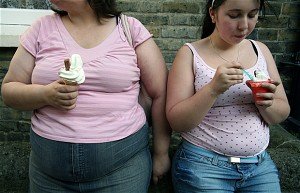)
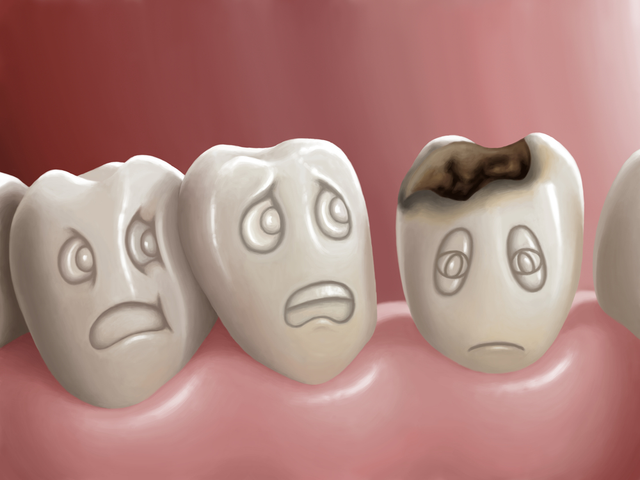)
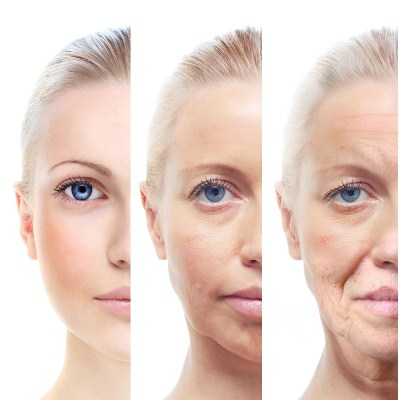)
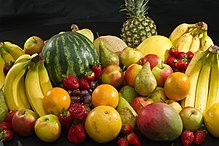)
Eh, diets with dairy seem to just increase your risk for a lot of diseases and complications, animal milk and cow milk aren't really necessary parts of anyone's health, balanced diet. And yes, even fresh-squeezed fruit juice made in a juicing machine will be stripped of all of the fibers that slow digestion of the sugars. I don't think that things like agave are any better than regular sugar, their glycemic load is still huge and it might just be marketing that is trying to convince people that it is somehow better, as it's quite trendy right now.
For me, sugar addiction is stronger than cocaine. I enjoy sugar like anything. But now that I have read your article now, It will be doing me somehow to take sugar.
Thanks oh.
Nice post brother
@addempsea, thank you bro.
I totally agree with you here. More chances of recovering from cocaine addiction than sugar.
I overhear people say "Sugar is life", Sugar is death also too oo LOL
The only reason why I think it's addiction is stronger is because it's cheaper than cocaine.